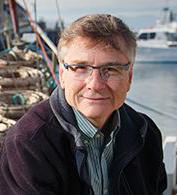Professor of Fisheries and Ecological Modelling, Reg Watson is looking for an answer to that question. He is conducting global fisheries research that allows authorities and NGOs to make informed decisions about the future of our marine environments. A global seafood certification system, fisheries mapping and geo-engineering in our oceans are the focus of his research.
'I began my career in government, supporting the fishing industry; then for more than a decade I worked as a marine conservationist. Conservationists have traditionally considered fisheries to be bad. But as my career progressed, I realised that pressures were going to mount on food from the oceans, and to ensure sustainability, I needed to have a foot in both camps,' said Professor Watson.
People need nutrients and food. Starving people will feed themselves illegally if they have to, and when food is short on the land, people tend to look to the oceans.
'We need to look ahead and pre-empt the future demands on the oceans and make policy decisions about it now. We need to find ways for fishing to happen as well as it can on a global scale, and serve our needs.'
Professor Watson is exploring a global seafood tracking system that will examine the source of all seafoods, even those not currently certified.
'To ensure that fishing is done sustainably, we should be able to track where and how the seafood was harvested and produced, and who imported it.
'This would also benefit the marketing of Australian seafood and help consumers make informed purchasing decisions. People want to know where their food comes from,' he said.
Professor Watson's research has drawn attention to the lack of good global statistics on fishing. By mapping fisheries, he has empowered decision-makers to look at what was previously too hard.
His research is also concerned with geo-engineering in our oceans.
'The world has finite production from the sun. We've changed the planet to produce far more food on the land. This is likely to be the case in our oceans as well.'
Geo-engineering would see something put into the ocean to change it. Like fertilising crops on the land, oceans could also be fertilised so that algae grow and remove greenhouse gases from the atmosphere. Greenhouse gases could also be injected into the oceans to moderate climate change. Professor Watson is concerned that this will happen without sufficient study.
The richest fisheries in the world are where algae are rich. The question is, could we make the situation in the oceans better or will we make things worse?
Professor Watson said that scientists have to be involved with the broader public policy debate.
'As a marine conservationist, I want to ensure that we have made the best of the situation, that we have the best future possible. Conservationists, policy makers and fisheries need to work together creatively to find the way forward,' said Professor Watson.
The Institute for Marine and Antarctic Studies (IMAS) brings together marine conservationists and fisheries scientists in one organisation, which is unique. It makes it an ideal place to conduct research in this field.
Professor Watson said the bottom line is that demand for food from our oceans is increasing.
We need to acknowledge that this is coming and find the best path forward.
View some of Professor Watson's highlighted publications
2015. Christensen V, Coll M, Buszowski J, Cheung WWL, Frolicher T, et al., 'The global ocean is an ecosystem: simulating marine life and fisheries', Global Ecology and Biogeography, 24, (5) pp. 507-517. ISSN 1466-822X (2015) [Refereed Article]
2015. Watson RA, Nowara GB, Hartmann K, Green BS, Tracey SR, et al., 'Marine foods sourced from farther as their use of global ocean primary production increases', Nature Communications, 6 Article 7365. ISSN 2041-1723 (2015) [Refereed Article]
Interested in conducting your own research? Apply now to become a research student.
